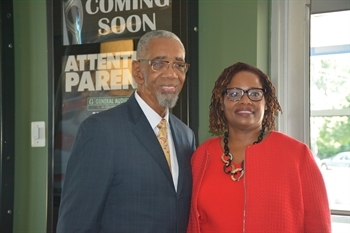Glen Fulton, the development corporation’s president, said they are still negotiating to get all the funds to run the center, but said they’re “almost there” and there has been “a lot of movement.”
The center would create 750-1,200 full-time jobs over a three-year period, Fulton said. About 90 percent of the jobs would be customer service, entry-level positions; the remaining 10 percent would be technical assistant jobs.
Sawyer praised the new initiative, which is a collaborative effort between elected officials, the private and public sectors and community groups.
The idea to create the initiative came from Rush a few days after special education teacher Betty Howard was fatally shot outside, across from his office in May of 2014.
There are more than 200 partners, said the initiative’s executive director Nedra Fears.

Congressman Bobby Rush and Nedra Fears (Executive Director, Greater Chatham Initiative)
“We now have data to prove what we need to do to really move the community forward,” she said. “So now with this basic ground work, we can put the actions in place.”
For the last two years, organizations researched what made those communities thrive in the past. Six key areas to focus on were identified: human capital and workforce development; business development; housing; public safety; support services and amenities; and civic capacity and institutional environment.
Fears said that when it comes to improving the business development component, the partners will have to focus on five sectors: business services and headquarters; transportation logistics and distribution; food packaging and manufacturing; retail; and health.
The goal is to help identify business owners who need additional venture capital, she said.
“We want them to be the economic engines for our communities because when you spend a dollar at a big box store that dollar turns over once in the community and goes out,” but when you spend a dollar in a local store that dollar turns over 4-7 times and so it’s our intent to lift up those businesses in our community.”
Some strategies outlined in the initiative for business development include:
• Target business and industrial land development toward high-priority regional clusters
• Grow Greater Chatham’s concentration of Business-to-Consumer (B2C) firms
• Develop retail and consumer service amenities tailored to residents
• Support entrepreneurship and innovation districts
Rush said that his first part-time job was in at a men’s clothing store in the community, but teens and young adults don’t have as many job options in the neighborhood like he did. He said wants to see more small businesses in Chatham.
“Chatham used to have more minority community residents owning businesses there,” he said, adding that at least 90 percent of the business owners don’t live in Chatham. “[They’re] owned by people who don’t live in Chatham and they take our money, our resources ... to the suburban communities.”
He said the Greater Chatham Initiative will address that issue.
Exelon Vice President William Von Hoene Jr. announced a three-year, $300,000 grant to the initiative, while ComEd will give a $90,000 grant toward workforce development.